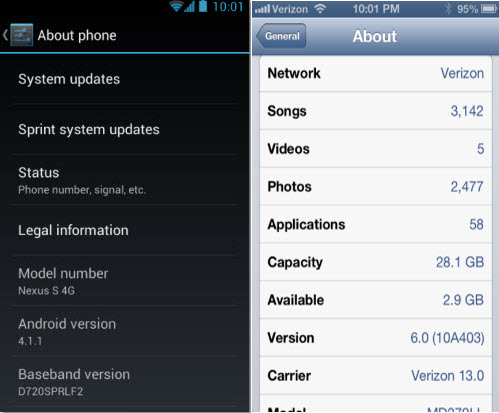iOS and Android update process compared


As I mentioned earlier, I am in no hurry to swap my iPhone 4S for the new iPhone 5. That decision was easy because yesterday Apple rolled out the iOS 6 update for iPhones and iPads.
After months of waiting I was surprised to see my Jelly Bean update was available for my Nexus S 4G on the same day iOS 6 was released. Updating both phones at the same time drove home the reality of updates on the two platforms.
The update on the iPhone 4S was flawless. It didn't take very long even though Apple's servers must have been slammed with everyone updating at the same time. The entire process was straightforward and in short order I was packing what in essence is a new iPhone.
There are reports of some iPhone owners having problems with Wi-Fi after updating to iOS 6, but I am not one of those. Maybe I'm lucky but my Wi-Fi is working perfectly with iOS 6.
My iPhone 4S is like a new phone in surprising ways. The overall operation is faster than it's ever been, and even the operation is smoother than ever. It is a tremendous update for me so far.
While the iPhone received the latest iOS update immediately after its release, the same couldn't be said for the Android Jelly Bean update.
Even though the Nexus S 4G is a Google Android flagship phone, the Jelly Bean update has been anything but prompt. This update was greatly delayed just like the previous Ice Cream Sandwich update. Google lets the handset makers and carriers control the update, so delayed for months it has been until yesterday.
The Jelly Bean update process started off nicely. The update downloaded OTA and then rebooted the phone for the install. That went well too, at first.
The system update applied and then Jelly Bean started optimizing (whatever that means) installed apps for the new OS. That took a while and then the phone rebooted again. Once complete I ran the Google Play Store app to see if any apps needed updating, but the Play app crashed immediately upon opening.
This kept happening so I manually rebooted the Nexus S 4G to see if that would clear it up. The Play Store app is critical for getting and updating apps and I needed to get it running.
The manual reboot worked and the process quickly informed me it was optimizing some other apps for Jelly Bean. I don't know which apps or why they weren't "optimized" the first time around.
Once that finished I ran the Play Store app again with the same results, it crashed. I manually rebooted the phone yet again and then the Play store ran properly. No telling why it finally worked.
I was then confronted with an error screen informing me that "there was a problem communicating with Google's servers, try again later". I use Gmail and the Google cloud heavily, so this prevented me from doing anything with Google for about an hour until the servers mysteriously came back.
This update comparison verifies what is frequently said about iOS and Android. Apple's devices get updates all at once with no waiting. The update process tends to go without issues, and life goes on.
Android on the other hand, is a mixed bag. Some phones still haven't received the Jelly Bean update and perhaps never will. My experience with the Nexus S 4G shows that even going with a flagship phone for Android isn't a sure bet for prompt updates. I have been waiting for months for each major Android update, even while Google was promising that wouldn't be the case.
The difficulty getting Android updates out even for Google's own devices convinces me that the updates are unusually complicated to get right. I don't see it getting any better as it's been this way since the birth of Android. It will always be hit or miss if/when any given Android phone/tablet will get an update, or how good the experience will be.
Before Android enthusiasts jump in with the inevitable comment that all I have to do is root and install a custom ROM to get the latest and greatest, let me make it clear I don't want to do that. When I buy a Google flagship phone I should get updates right away without jumping through hoops. I don't like how rooting and replacing shipping software cuts me off from official updates. That's why I don't jailbreak my iOS devices either.